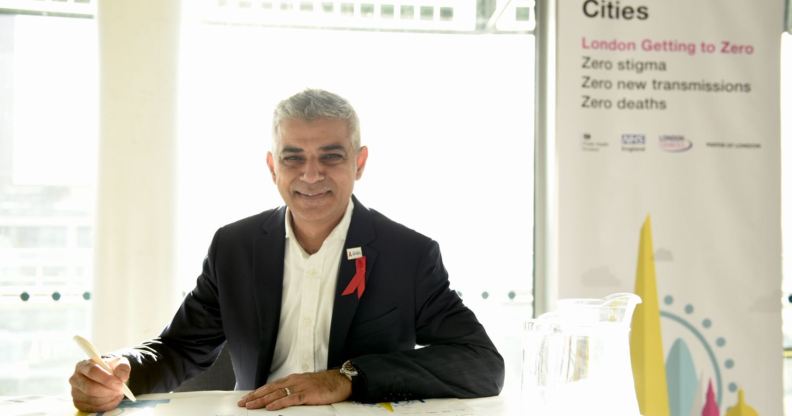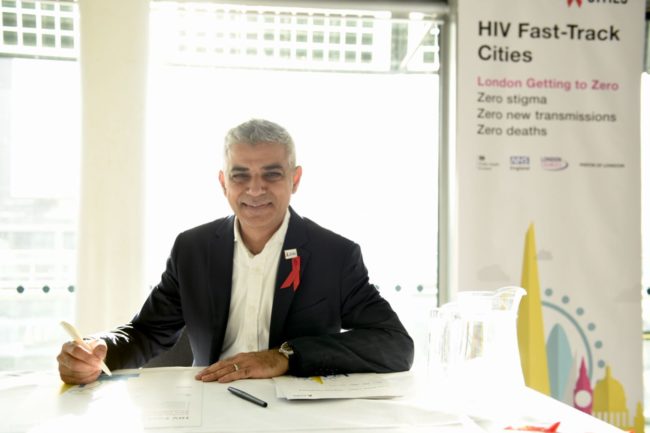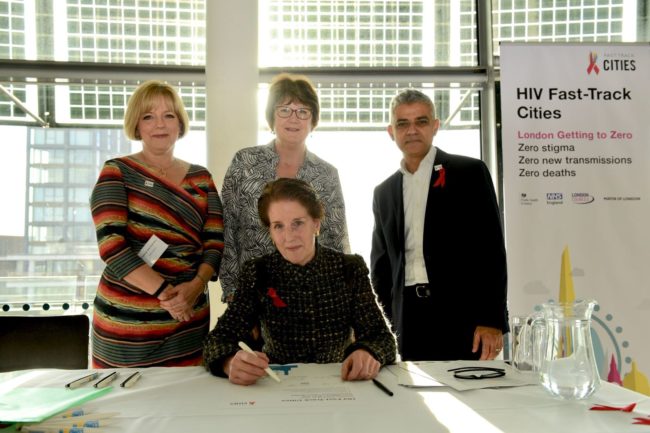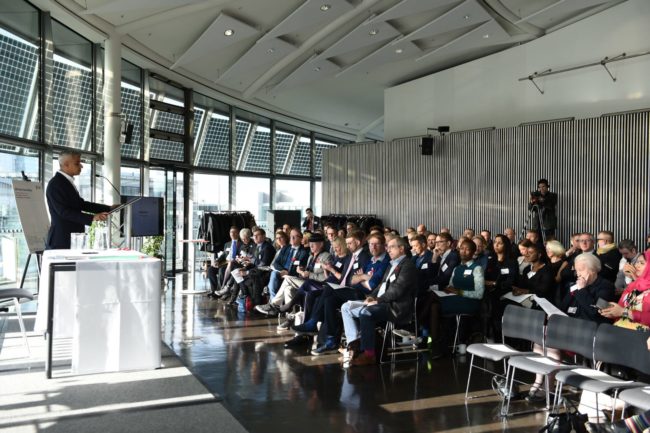Mayor of London Sadiq Khan vows to eradicate HIV infections in the capital by 2030

Mayor of London Sadiq Khan has vowed to “end new HIV infections” in the UK’s capital by 2030.
Mr Khan made the pledge as he signed the Paris Declaration on Fast-Track Cities Ending the AIDS Epidemic, vowing to cut rates of new HIV infection in the capital and eliminate discrimination and stigma associated with the condition.
The Fast-Track Initiative includes a commitment to end new HIV infections in the capital by 2030, tackle HIV-related stigma, and ensure that at least 90% of people living with HIV are diagnosed.
The Mayor signed up along with borough leaders, Public Health England and NHS England.

Mr Khan said: “Over the past year, we’ve seen a dramatic decline in the numbers of new HIV diagnoses and, for the first time in decades, ending new HIV infections in the capital is a real possibility – but we cannot be complacent.
“Reducing new infections is a complex issue which requires continued education, expanded testing, prompt access to treatment and the availability of preventative HIV treatment, including PrEP on the NHS.
“By signing London up as a Fast-Track City, we are taking on the challenge to end new HIV infections in the capital by 2030. We must be ambitious, and I am confident that by working together we can achieve this goal.
“As well as putting an end to new infections, I am clear that HIV-related stigma and discrimination must end too. Improving the quality of life and wellbeing of those living with HIV in London is a priority for me, which is why I’m proud to sign this commitment today.”
The city will now set out an Action Plan in HIV/AIDS which will outline how London will reach the Fast-Track City targets.

London has long been the epicentre of HIV infections in the UK.
In 2016, an estimated 38,700 people were living with HIV in London, which represents 43 per cent of all people living with HIV in England. The population groups most affected by HIV are gay and bisexual men, and people of black African heritage.
The city has made vast progress, however, and in 2016 managed to meet UN targets across three factors – with 90 per cent of people living with HIV knowing their status, 90 per cent of people with diagnosed HIV undergoing treatment, and 90 per cent of people on treatment having suppressed viral loads, which reduces risk of ifection.
London is only the third city to meet the targets, joining Amsterdam and Melbourne.
However, the needs of people living with HIV in London are changing and becoming more complex.
Due to the effectiveness of medical treatment, people living with HIV are now growing older, bringing new health challenges. And despite some shifts in public attitudes, many people in the UK still hold discriminatory views towards people living with HIV.

Cllr Kevin Davis, London Councils’ Executive member for health, said: “Improving residents’ health and wellbeing is a priority for London boroughs, which is why we are delighted to sign up to the HIV Fast-Track Cities initiative to spur on London’s fight against HIV.
“By working with colleagues across the capital we can be even more ambitious and build on the success of Do It London, the London borough-led HIV prevention campaign, and the remarkable 40 per cent decrease in HIV diagnoses seen in central London clinics last year.”
NHS Regional Director for London, Professor Jane Cummings: “London is doing very well in HIV prevention and treatment, however there is still more work to be done which is why I’m delighted to pledge our support and sign up to the Fast-Track Cities Initiative.
“We are committed to working together to improve the health, quality of life and wellbeing of people living with HIV and to eliminate stigma and discrimination.”
Professor Yvonne Doyle, London Regional Director for Public Health England, and Statutory Health Advisor to the Mayor of London, said: “I am delighted that London is joining forces with other global cities to draw on our collective expertise and keep the pressure and focus on HIV. London has a proud history of innovative approaches to prevention together with excellent treatment and care for people living with HIV.
“Whilst we have seen a significant drop in new HIV diagnoses in gay and bisexual men in London there is still work to be done to ensure that this trend is seen in other population groups. To this end I am committed to work with and involve all populations in London to realise our ambition of ending new HIV infections by 2030.”
President of the International Association of Providers of AIDS Care (IAPAC) and UNAIDS Special Advisor on Fast-Track Cities, Dr. José M. Zuniga, said: £We welcome London as a Fast-Track City and applaud the local stakeholders whose actions have contributed to attaining the UN’s 90-90-90 targets – placing the UK’s capital city on a trajectory toward ending AIDS as a public health threat by 2030. We look forward to working with Mayor Sadiq Khan, London Councils, Public Health England, NHS England, clinical and service providers, and affected communities, to translate your commitment into further accelerated actions that will have local and global impact.”
Chair of UK Community Advisory Board (UK-CAB), Garry Brough, said: “I am thrilled that London is joining the Fast Track Cities Initiative and committing to achieving zero HIV stigma, transmissions and deaths by 2030.
“While we are already seeing new infections decrease as a result of achieving the 90/90/90 goals, there is still much to do in challenging public misconceptions and judgements about HIV. These stigmatising beliefs can have a significant impact on the quality of life of people living with HIV, so eliminating stigma has the potential to not only improve psychological wellbeing, but to reduce anxieties about testing which result in late diagnoses and deaths.
“It is the key to supporting health and wellbeing and engaging that final 10 per cent so that we can get to zero by 2030.”
Deborah Gold, Chief Executive of National AIDS Trust, said: “I am absolutely delighted that London has signed up to be a Fast Track City, working to eliminate HIV. London is a world leader in its response to HIV, and the latest data shows that it meets the UNAIDS 90-90-90 targets for diagnosis, treatment and numbers of people living with HIV who have an undetectable viral load.
“But we will be unable to make real progress without also eliminating HIV stigma and discrimination, which permeates all areas of life for those at risk of and living with HIV. We look forward to working to create the first HIV stigma free city.”
Ian Green, CEO, Terrence Higgins Trust said: “This move demonstrates Sadiq Khan’s commitment to reducing HIV stigma, and to completely eradicating HIV transmission in the capital before 2030.
“Although ambitious, this is absolutely achievable, but requires us doubling-down on our efforts and not becoming complacent. We must see a range of sexual health services available and maintained, better access to preventative treatment including PrEP and the introduction of inclusive Relationships and Sex Education as compulsory in schools.”
Chloe Orkin, Chair of British HIV Association (BHIVA), said: “Meeting the UN’s 90: 90: 90 targets is a huge achievement for London, and one to be proud of. People with well-controlled HIV can live to an old age and, importantly, cannot pass HIV on to others.
“If we are to reach zero transmissions, HIV testing must be easily accessible for those who do not yet know that they are HIV positive, so that they can take life-saving treatment. Making testing accessible takes political will. BHIVA thanks the Mayor for making this commitment to equality in access to diagnosis.”

